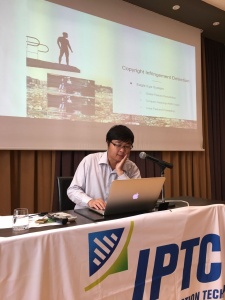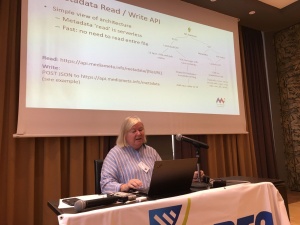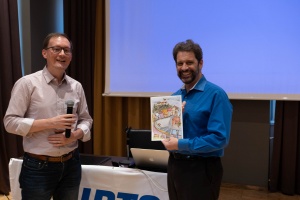Categories
Archives
Day 2 of the IPTC Autumn Meeting 2019 was just as busy as Day 1: we heard from the IPTC NewsCodes Working Group, the AI Expert Group, and the News Architecture Working Group including updates on IPTC’s work on trust and credibility projects. We also had updates from the Video Metadata Working Group, an update on IPTC’s Rights work, and news from the Sports Content Working Group. Phew!
Jennifer Parrucci from the New York Times, lead of the IPTC NewsCodes Working Group, introduced IPTC NewsCodes and discussed recent progress, including cleaning up large parts of the Media Topics vocabulary. The Working Group also announced new language translations coming very soon: Portuguese and Brazilian Portuguese are ready, Chinese is almost ready, and some other language versions are in progress.
We also had an interesting and productive discussion about the workflow and process around Media Topics translations. As the team adds and retires terms and definitions, how should translations be managed? Should we not publish changes until we have translations in all languages? Or should there be a core of languages that require translations? Should we publish interim versions with un-synced changes and less frequent “stable” versions of Media Topics including all translations? We are having success using GitHub issues to manage regular changes to the taxonomy: can technology also help in managing the translation process and if so, which tools? Many ideas and thoughts were shared, including the perspectives of many member organisations who already work across multiple languages.

Tao Chen, VP of Machine Learning at 500px and lead of the new AI Expert Group, gave a great overview of the latest developments in AI affecting the media industry. From practical developments, like removing backgrounds from stock images, detecting copyright infringement and assessing the commercial potential of images, to the dangers of face swapping apps and a potential future of completely generated images that feature no real human beings, we learned a lot about how AI affects us today and tomorrow. We are building up the AI Expert Group to become the place where media technologists can go to learn the latest on AI and Machine Learning issues, apply the latest techniques in the media industry, and share ideas with their peers. If you’re a member and not yet involved, please talk to Tao or Brendan to get started.
Next up, Brendan Quinn spoke about IPTC’s recent work with the Journalism Trust Initiative and The Trust Project, on mapping their “trust indicators” to IPTC standards (particularly NewsML-G2) so news providers can show how they comply with trust criteria. Look out for some announcements about this work in the next few weeks. Then Dave Compton of Refinitiv, lead of the News Architecture Working Group gave an update on recent work on NewsML-G2, including the trust and credibility work, a NewsML-G2 2.28 errata release fixing some small typo errors, updates to the NewsML-G2 Guidelines and the NewsML-G2 Specification documents, work on making local extensions to Media Topics, and future work, including looking at how to represent auto-generated content, and better alignment with ninjs (see Monday’s wrap-up post for more on our recent ninjs updates).

After lunch, Pam Fisher of The Media Institute at University College London spoke about her project to build a read/write API that maps metadata between various video formats. We will link to a demo as soon as it is available. Pam also discussed “compact video signatures”, part of MPEG7, which are being used to make content fingerprints for video content, used for infringement detection and content matching.
Pam’s talk was very relevant to the next discussion by Michael Steidl, lead of the Video Metadata Working Group updating on recent progress. The Working Group has been looking at new video APIs and understanding how IPTC members and others are using video metadata in their work, either with or without IPTC Video Metadata Hub.
In the afternoon Michael Steidl presented again with an update on his work with W3C’s ODRL group which impacts on RightsML. Johan Lindgren presented in lieu of Paul Kelly, new Lead of the Sports Content Working Group, giving an update on the Working Groups efforts to interview IPTC members and others about their use of sports data and to position SportsML and our work on SportsJS in the context of the news and media industry.

Finally we bade farewell to Stuart Myles, outgoing Chair of IPTC. We presented Stuart with a small token of our thanks for chairing the Board of Directors of IPTC since 2014, and has been involved with IPTC as a delegate since 1999! We will definitely miss his contributions, intelligence, common sense and enthusiasm, and we hope to see him involved with IPTC again in the future in some way.